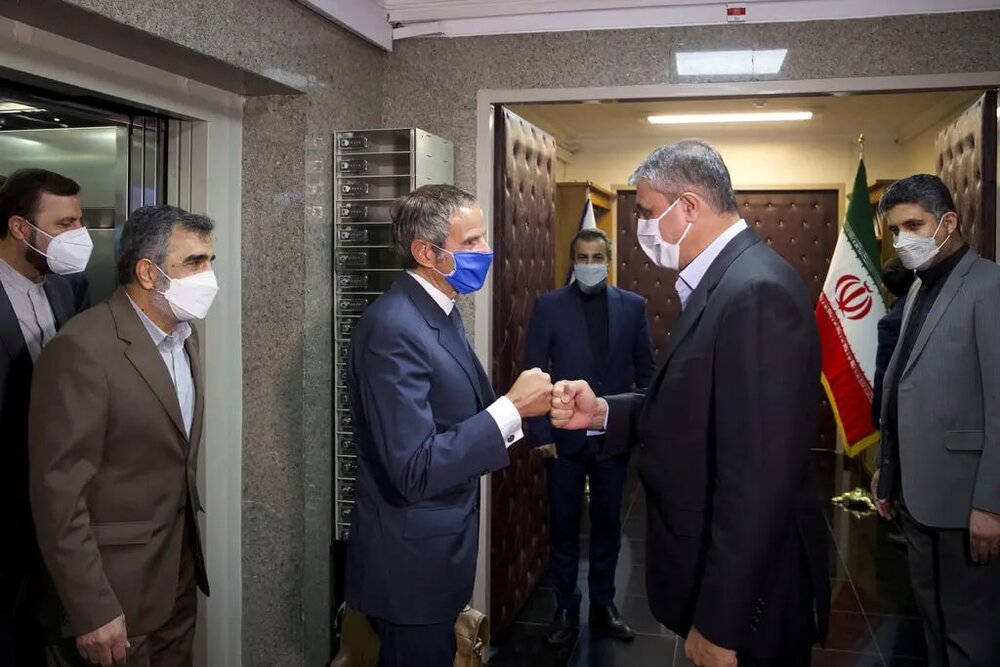Revival of JCPOA hinges on IAEA behavior

TEHRAN – Iran has rejected the allegation by Western media that it has backed down on its demand for closing a UN nuclear watchdog probe into its past nuclear activities, saying that the revival of the 2015 Iran nuclear deal depends on the closing of that probe.
The head of the Atomic Energy Organization of Iran (AEOI), Mohammad Eslami, reacted to Western allegations that Iran has dropped a demand for the International Atomic Energy Agency to end its probe.
The IAEA’s investigation into Iran’s alleged past nuclear activities has been a major source of contention in the talks in Vienna over reviving the 2015 Iran nuclear deal, officially known as the Joint Comprehensive Plan of Action (JCPOA). The IAEA claims that it found uranium particles in a number of “undeclared” sites in Iran. It presented Iran with a set of questions on the sites. Iran provided answers but the IAEA keeps insisting that the Iranian answers are not technically credible.
On the other hand, Iran said the IAEA has moved away from its mandate by pursuing unfounded allegations propagated by Israel, a staunch opponent of the JCPOA. Iran said the IAEA, in its dealings with Iran, has not been technical and its behavior is politically motivated.
In his recent phone call with the UN secretary-general, the Iranian foreign minister said Iran had reminded all negotiating partners that it is “highly essential” to resolve all “artificial and politically-motivated Safeguards” issues pertaining to Iran’s nuclear program.
He added Iran has shown “strong, serious and real will for” reviving the JCPOA, and “we have shown this in practice.”
Iranian President Ayatollah Seyed Ebrahim Raisi underlined the same position on Tuesday. Speaking at a press conference attended by Iranian and foreign reporters, Ayatollah Raisi said Iran has been committed to negotiations while also working to neutralize U.S. sanctions.
He outlined the parameters for reaching a deal, saying that such a deal would require four conditions: credible guarantees, practical verification of sanctions removal, lasting and meaningful sanctions relief, and the closure of political allegations made by the International Atomic Energy Agency.
Ayatollah Raisi said the talks are proceeding within the framework of removing U.S. sanctions on Iran. In this regard, he put emphasis on the need to put an end to the IAEA probe into Iran’s past nuclear activity, which has been triggered by allegations submitted by Israel.
Relying on Israel-supplied documents, the IAEA has requested answers from Iran about nuclear particles found at a number of Iranian sites. Iran gave its answers but the IAEA insists on greater cooperation, a move that has been seen by Iran as politically motivated and incompatible with the technical nature of IAEA work.
President Raisi said reaching a deal is now dependent on the IAEA closing its probe. “We emphasized verification and confidence-building assurances in the negotiations. We also emphasize that safeguards issues must be resolved and this is a pillar in the negotiations and without it, the talk of an agreement has no meaning,” he said.
Raisi added, “The agreement should be accompanied by the resolution of safeguards issues and points that Iran follows as a strategy. We have not and will not fail to realize the interests of the Iranian nation.”
Eslami said Wednesday that reviving the JCPOA is now dependent on how the IAEA tackles its probe.
He reiterated that if the IAEA does not close its probe, there will be no such thing as “Reimplementation Day,” a stage in the process of reviving the JCPOA that would come nearly four months after the start of the process.
Commenting on the Western reports that Iran dropped its demand for closure of the IAEA probe, Eslami told ISNA, “What we have written [to the West] is decisive. Our intention and emphasis are that if these questions are not closed by the Reimplementation Day, there will be no Reimplementation Day. We did not back down and we cannot back down.”
Iran and its negotiating partners have been engaged in long, painstaking talks since April 2021. Since then, more than eight rounds of talks have been held, which resulted in producing a draft agreement.
Eslami said this draft agreement is the result of the Iranian body politic, not a certain faction.
